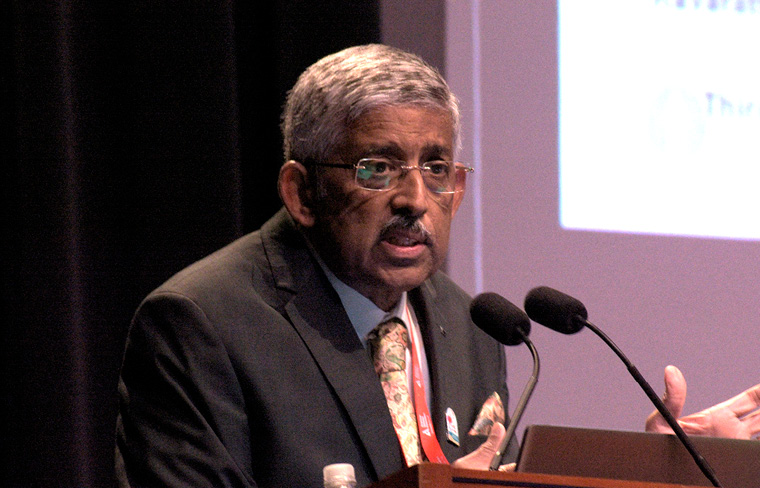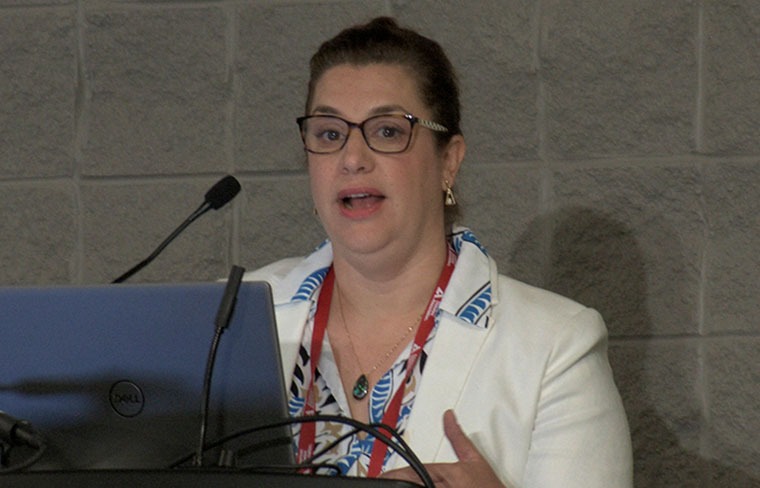-
Experts debate optimal strategies for the allocation of antiobesity medications
Deborah Horn, DO, MPH, MFOMA, Pam R. Taub, MD, FACC, FASPC, and Neda Rasouli, MD, offered different perspectives on which patients should receive priority when determining access to glucagon-like peptide-1 (GLP-1) receptor agonists.
-
New signaling molecules redefine understanding of glucose uptake
Panelists discussed novel insulin-dependent and insulin-independent mechanisms of glucose transport into skeletal muscles. Katrin Svensson, PhD, showed that the protein isthmin-1, which is secreted by adipose cells, has some of the same activities as insulin.
-
Banting Medal recipient recounts significant discoveries from five decades of impactful diabetes research
Rury R. Holman, MBChB, FRCP(Lond), FMedSci, co-led the UKPDS trial, which found that progressive hyperglycemia is a key feature of type 2 diabetes driven by the declining function of beta-cells, as opposed to insulin resistance.
-
Outstanding Scientific Achievement Award winner advances understanding of epigenetics of type 2 diabetes predisposition
Stephen C.J. Parker, PhD, likened his work to assembling LEGO bricks. Simple parts are assembled to form complex structures that do not resemble the components in form or function.
-
Kelly West Award lecturer highlights underpinnings of South Asian phenotype of type 2 diabetes
V. Mohan, MD, PhD, DSc, FRCP, FNA, FACE, MACP, FRSE, highlighted the increase in type 2 diabetes among Asian Indians, concomitant with the socioeconomic growth fostered by the liberalization and globalization of India.
-
STEP trials show heart failure benefit with or without diabetes, could transform HFpEF treatment
Two trials of semaglutide show similar improvement in heart failure symptoms and weight loss in patients with BMI >30 who have heart failure with preserved ejection fraction with or without diabetes, reported Mikhail N. Kosiborod, MD, and other investigators.
-
Symposium disentangles perception from reality regarding potential adverse effects of GLP-1 RAs
A diverse lineup of experts including John-Michael Gamble, PhD, took a deep dive into the data on known and potential severe adverse effects of glucagon-like peptide-1 (GLP-1) receptor agonists.
-
Experts examine link between loneliness and diabetes
Loneliness and social isolation are related but different. Anne Gaglioti, MD, MS, FAAFP, and other panelists discussed loneliness, its link to diabetes, and the psychological toll it takes on patients living with diabetes.
-
Panelists discuss critical nature of post-transplant diabetes
A diagnosis of post-transplant diabetes (PTDM) can directly affect the patient’s outcome. Archana R. Sadhu, MD, FACE, and other experts discussed the pathophysiology and patient management of PTDM.
-
ADA initiative aims to improve primary care for diabetes
Members of the new Diabetes Primary Care Alliance came together to discuss opportunities to improve diabetes outcomes by accelerating the adoption of evidence-based standards of care in primary care.











